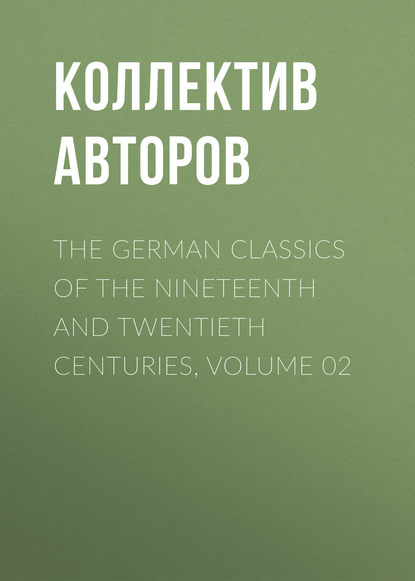По всем вопросам обращайтесь на: info@litportal.ru
(©) 2003-2024.
✖
The German Classics of the Nineteenth and Twentieth Centuries, Volume 02
Настройки чтения
Размер шрифта
Высота строк
Поля
"Our friend must not think," he said to Charlotte, "that this narrow little valley forms the whole of our domain and possessions. Let us take him up to the top of the hill, where he can see farther and breathe more freely."
"For this once, then," answered Charlotte, "we must climb up the old footpath, which is not too easy. By the next time, I hope my walks and steps will have been carried right up."
And so, among rocks, and shrubs, and bushes, they made their way to the summit, where they found themselves, not on a level flat, but on a sloping grassy terrace, running along the ridge of the hill. The village, with the castle behind it, was out of sight. At the bottom of the valley, sheets of water were seen spreading out right and left, with wooded hills rising immediately from their opposite margin, and, at the end of the upper water, a wall of sharp, precipitous rocks directly overhanging it, their huge forms reflected in its level surface. In the hollow of the ravine, where a considerable brook ran into the lake, lay a mill, half hidden among the trees, a sweetly retired spot, most beautifully surrounded; and through the entire semicircle, over which the view extended, ran an endless variety of hills and valleys, copse and forest, the early green of which promised the near approach of a luxuriant clothing of foliage. In many places particular groups of trees caught the eye; and especially a cluster of planes and poplars directly at the spectator's feet, close to the edge of the centre lake. They were at their full growth, and they stood there, spreading out their boughs all around them, in fresh and luxuriant strength.
To these Edward called his friend's attention.
"I myself planted them," he cried, "when I was a boy. They were small trees which I rescued when my father was laying out the new part of the great castle garden, and in the middle of one summer had rooted them out. This year you will no doubt see them show their gratitude in a fresh set of shoots."
They returned to the castle in high spirits, and mutually pleased with each other. To the guest was allotted an agreeable and roomy set of apartments in the right wing of the castle; and here he rapidly got his books and papers and instruments in order, to go on with his usual occupation. But Edward, for the first few days, gave him no rest. He took him about everywhere, now on foot, now on horseback, making him acquainted with the country and with the estate; and he embraced the opportunity of imparting to him the wishes which he had been long entertaining, of getting at some better acquaintance with it, and learning to manage it more profitably.
"The first thing we have to do," said the Captain, "is to make a magnetic survey of the property. That is a pleasant and easy matter; and if it does not admit of entire exactness, it will be always useful, and will do, at any rate, for an agreeable beginning. It can be made, too, without any great staff of assistants, and one can be sure of getting it completed. If by-and-by you come to require anything more exact, it will be easy then to find some plan to have it made."
The Captain was exceedingly skilful at work of thus kind. He had brought with him whatever instruments he required, and commenced immediately. Edward provided him with a number of foresters and peasants, who, with his instruction, were able to render him all necessary assistance. The weather was favorable. The evenings and the early mornings were devoted to the designing and drawing, and in a short time it was all filled in and colored. Edward saw his possessions grow out like a new creation upon the paper; and it seemed as if now for the first time he knew what they were, as if they now first were properly his own.
Thus there came occasion to speak of the park, and of the ways of laying it out; a far better disposition of things being made possible after a survey of this kind, than could be arrived at by experimenting on nature, on partial and accidental impressions.
"We must make my wife understand this," said Edward.
"We must do nothing of the kind," replied the Captain, who did not like bringing his own notions in collision with those of others. He had learnt by experience that the motives and purposes by which men are influenced are far too various to be made to coalesce upon a single point, even on the most solid representations. "We must not do it," he cried; "she will be only confused. With her, as with all people who employ themselves on such matters merely as amateurs, the important thing is, rather that she shall do something, than that something shall be done. Such persons feel their way with nature. They have fancies for this plan or that; they do not venture on removing obstacles. They are not bold enough to make a sacrifice. They do not know beforehand in what their work is to result. They try an experiment—it succeeds—it fails; they alter it; they alter, perhaps, what they ought to leave alone, and leave what they ought to alter; and so, at last, there always remains but a patchwork, which pleases and amuses, but never satisfies."
"Acknowledge candidly," said Edward, "that you do not like this new work of hers."
"The idea is excellent," he replied; "if the execution were equal to it, there would be no fault to find. But she has tormented herself to find her way up that rock; and she now torments every one, if you must have it, that she takes up after her. You cannot walk together, you cannot walk behind one another, with any freedom. Every moment your step is interrupted one way or another. There is no end to the mistakes which she has made."
"Would it have been easy to have done it otherwise?" asked Edward.
"Perfectly," replied the Captain. "She had only to break away a corner of the rock, which is now but an unsightly object, made up as it is of little pieces, and she would at once have a sweep for her walk and stone in abundance for the rough masonry work, to widen it in the bad places, and make it smooth. But this I tell you in strictest confidence. Her it would only confuse and annoy. What is done must remain as it is. If any more money and labor is to be spent there, there is abundance to do above the summer-house on the hill, which we can settle our own way."
If the two friends found in their occupation abundance of present employment, there was no lack either of entertaining reminiscences of early times, in which Charlotte took her part as well. They determined, moreover, that as soon as their immediate labors were finished, they would go to work upon the journal, and in this way, too, reproduce the past.
For the rest, when Edward and Charlotte were alone, there were fewer matters of private interest between them than formerly. This was especially the case since the fault-finding about the grounds, which Edward thought so just, and which he felt to the quick. He held his tongue about what the Captain had said for a long time; but at last, when he saw his wife again preparing to go to work above the summer-house, with her paths and steps, he could not contain himself any longer, but, after a few circumlocutions, came out with his new views.
Charlotte was thoroughly disturbed. She was sensible enough to perceive at once that they were right, but there was the difficulty with what was already done—and what was made was made. She had liked it; even what was wrong had become dear to her in its details. She fought against her convictions; she defended her little creations; she railed at men who were forever going to the broad and the great. They could not let a pastime, they could not let an amusement alone, she said, but they must go and make a work out of it, never thinking of the expense which their larger plans involved. She was provoked, annoyed, and angry. Her old plans she could not give up, the new she would not quite throw from her; but, divided as she was, for the present she put a stop to the work, and gave herself time to think the thing over, and let it ripen by itself.
At the same time that she lost this source of active amusement, the others were more and more together over their own business. They took to occupying themselves, moreover, with the flower-garden and the hot-houses; and as they filled up the intervals with the ordinary gentlemen's amusements, hunting, riding, buying, selling, breaking horses, and such matters, she was every day left more and more to herself. She devoted herself more assiduously than ever to her correspondence on account of the Captain; and yet she had many lonely hours; so that the information which she now received from the school became of more agreeable interest.
To a long-drawn letter of the superior of the establishment, filled with the usual expressions of delight at her daughter's progress, a brief postscript was attached, with a second from the hand of a gentleman in employment there as an Assistant, both of which we here communicate.
POSTSCRIPT OF THE SUPERIOR
"Of Ottilie, I can only repeat to your ladyship what I have already stated in my former letters. I do not know how to find fault with her, yet I cannot say that I am satisfied. She is always unassuming, always ready to oblige others; but it is not pleasing to see her so timid, so almost servile.
"Your ladyship lately sent her some money, with several little matters for her wardrobe. The money she has never touched, the dresses lie unworn in their place. She keeps her things very nice and very clean; but this is all she seems to care about. Again, I cannot praise her excessive abstemiousness in eating and drinking. There is no extravagance at our table, but there is nothing that I like better than to see the children eat enough of good, wholesome food. What is carefully provided and set before them ought to be taken; and to this I never can succeed in bringing Ottilie. She is always making herself some occupation or other, always finding something which she must do, something which the servants have neglected, to escape the second course or the dessert; and now it has to be considered (which I cannot help connecting with all this) that she frequently suffers, I have lately learnt, from pain in the left side of her head. It is only at times, but it is distressing, and may be of importance. So much upon this otherwise sweet and lovely girl."
SECOND POSTSCRIPT, BY THE ASSISTANT
"Our excellent superior commonly permits me to read the letters in which she communicates her observations upon her pupils to their parents and friends. Such of them as are addressed to your ladyship I ever read with twofold attention and pleasure. We have to congratulate you upon a daughter who unites in herself every brilliant quality with which people distinguish themselves in the world; and I at least think you no less fortunate in having had bestowed upon you, in your step-daughter, a child who has been born for the good and happiness of others, and assuredly also for her own. Ottilie is almost our only pupil about whom there is a difference of opinion between myself and our reverend superior. I do not complain of the very natural desire in that good lady to see outward and definite fruits arising from her labors. But there are also fruits which are not outward, which are of the true germinal sort, and which develop themselves sooner or later in a beautiful life. And this I am certain is the case with your protégée. So long as she has been under my care, I have watched her moving with an even step, slowly, steadily forward—never back. As with a child it is necessary to begin everything at the beginning, so it is with her. She can comprehend nothing which does not follow from what precedes it; let a thing be as simple and easy as possible, she can make nothing of it if it is not in a recognizable connection; but find the intermediate links, and make them clear to her, and then nothing is too difficult for her.
"Progressing with such slow steps, she remains behind her companions, who, with capacities of quite a different kind, hurry on and on, learn everything readily, connected or unconnected, recollect it with ease, and apply it with correctness. And again, some of the lessons here are given by excellent, but somewhat hasty and impatient teachers, who pass from result to result, cutting short the process by which they are arrived at; and these are not of the slightest service to her; she learns nothing from them. There is a complaint of her handwriting. They say she will not, or cannot, understand how to form her letters. I have examined closely into this. It is true she writes slowly, stiffly, if you like; but the hand is neither timid nor without character. The French language is not my department, but I have taught her something of it, in the step-by-step fashion; and this she understands easily. Indeed, it is singular that she knows a great deal, and knows it well, too; and yet when she is asked a question, it seems as if she knew nothing.
"To conclude generally, I should say she learns nothing like a person who is being educated, but she learns like one who is to educate—not like a pupil, but like a future teacher. Your ladyship may think it strange that I, as an educator and a teacher, can find no higher praise to give to any one than by a comparison with myself. I may leave it to your own good sense, to your deep knowledge of the world and of mankind, to make the best of my most inadequate, but well-intended expressions. You may satisfy yourself that you have much happiness to promise yourself from this child. I commend myself to your ladyship, and I beseech you to permit me to write to you again as soon as I see reason to believe that I have anything important or agreeable to communicate."
This letter gave Charlotte great pleasure. The contents of it coincided very closely with the notions which she had herself conceived of Ottilie. At the same time, she could not help smiling at the excessive interest of the Assistant, which seemed greater than the insight into a pupil's excellence usually calls forth. In her quiet, unprejudiced way of looking at things, this relation, among others, she was contented to permit to lie before her as a possibility; she could value the interest of so sensible a man in Ottilie, having learnt, among the lessons of her life, to see how highly true regard is to be prized in a world where indifference or dislike are the common natural residents.
CHAPTER IV
The topographical chart of the property and its environs was completed. It was executed on a considerable scale; the character of the particular localities was made intelligible by various colors; and by means of a trigonometrical survey the Captain had been able to arrive at a very fair exactness of measurement. He had been rapid in his work. There was scarcely ever any one who could do with less sleep than this most laborious man; and, as his day was always devoted to an immediate purpose, every evening something had been done.
"Let us now," he said to his friend, "go on to what remains for us, to the statistics of the estate. We shall have a good deal of work to get through at the beginning, and afterward we shall come to the farm estimates, and much else which will naturally arise out of them. Only we must have one thing distinctly settled and adhered to. Everything which is properly business we must keep carefully separate from life. Business requires earnestness and method; life must have a freer handling. Business demands the utmost stringency and sequence; in life, inconsecutiveness is frequently necessary, indeed, is charming and graceful. If you are firm in the first, you can afford yourself more liberty in the second; while if you mix them, you will find the free interfering with and breaking in upon the fixed."
In these sentiments Edward felt a slight reflection upon himself. Though not naturally disorderly, he could never bring himself to arrange his papers in their proper places. What he had to do in connection with others, was not kept separate from what depended only on himself. Business got mixed up with amusement, and serious work with recreation. Now, however, it was easy for him, with the help of a friend who would take the trouble upon himself; and a second "I" worked out the separation, to which the single "I" was always unequal.
In the Captain's wing, they contrived a depository for what concerned the present, and an archive for the past. Here they brought all the documents, papers, and notes from their various hiding-places, rooms, drawers, and boxes, with the utmost speed. Harmony and order were introduced into the wilderness, and the different packets were marked and registered in their several pigeon-holes. They found all they wanted in greater completeness even than they had expected; and here an old clerk was found of no slight service, who for the whole day and part of the night never left his desk, and with whom, till then, Edward had been always dissatisfied.
"I should not know him again," he said to his friend, "the man is so handy and useful."
"That," replied the Captain, "is because we give him nothing fresh to do till he has finished, at his convenience, what he has already; and so, as you perceive, he gets through a great deal. If you disturb him, he becomes useless at once."
Spending their days together in this way, in the evenings they never neglected their regular visits to Charlotte. If there was no party from the neighborhood, as was often the case, they read and talked, principally on subjects connected with the improvement of the condition and comfort of social life.
Charlotte, always accustomed to make the most of opportunities, not only saw her husband pleased, but found personal advantages for herself. Various domestic arrangements, which she had long wished to make, but which she did not know exactly how to set about, were managed for her through the contrivance of the Captain. Her domestic medicine-chest, hitherto but poorly furnished, was enlarged and enriched, and Charlotte herself, with the help of good books and personal instruction, was put in the way of being able to exercise her disposition to be of practical assistance more frequently and more efficiently than before.
In providing against accidents, which, though common, yet only too often find us unprepared, they thought it especially necessary to have at hand whatever is required for the recovery of drowning men—accidents of this kind, from the number of canals, reservoirs, and waterworks in the neighborhood, being of frequent occurrence. This department the Captain took expressly into his own hands; and the observation escaped Edward, that a case of this kind had made a very singular epoch in the life of his friend. The latter made no reply, but seemed to be trying to escape from a painful recollection. Edward immediately stopped; and Charlotte, who, as well as he, had a general knowledge of the story, took no notice of the expression.
"These preparations are all exceedingly valuable," said the Captain, one evening. "Now, however, we have not got the one thing which is most essential—a sensible man who understands how to manage it all. I know an army surgeon, whom I could exactly recommend for the place. You might get him at this moment, on easy terms. He is highly distinguished in his profession, and has frequently done more for me, in the treatment even of violent inward disorders, than celebrated physicians. Help upon the spot, is the thing you often most want in the country."
He was written for at once; and Edward and Charlotte were rejoiced to have found so good and necessary an object on which to expend so much of the money which they set apart for such accidental demands upon them.
Thus Charlotte, too, found means of making use, for her purposes, of the Captain's knowledge and practical skill; and she began to be quite reconciled to his presence, and to feel easy about any consequences which might ensue. She commonly prepared questions to ask him; among other things, it was one of her anxieties to provide against whatever was prejudicial to health and comfort, against poisons and such like. The lead-glazing on the china, the verdigris which formed about her copper and bronze vessels, etc., had long been a trouble to her. She got him to tell her about these, and, naturally, they often had to fall back on the first elements of medicine and chemistry.
An accidental, but welcome occasion for entertainment of this kind, was given by an inclination of Edward to read aloud. He had a particularly clear, deep voice, and earlier in life had earned himself a pleasant reputation for his feeling and lively recitations of works of poetry and oratory. At this time he was occupied with other subjects, and the books which, for some time past, he had been reading, were either chemical or on some other branch of natural or technical science.
One of his especial peculiarities—which, by-the-by, he very likely shares with a number of his fellow-creatures—was, that he could not bear to have any one looking over him when he was reading. In early life, when he used to read poems, plays, or stories, this had been the natural consequence of the desire which the reader feels, like the poet, or the actor, or the story-teller, to make surprises, to pause, to excite expectation; and this sort of effect was naturally defeated when a third person's eyes could run on before him, and see what was coming. On such occasions, therefore, he was accustomed to place himself in such a position that no one could get behind him. With a party of only three, this was unnecessary; and as with the present subject there was no opportunity for exciting feelings or giving the imagination a surprise, he did not take any particular pains to protect himself.
One evening he had placed himself carelessly, and Charlotte happened by accident to cast her eyes upon the page. His old impatience was aroused; he turned to her, and said, almost unkindly:
"I do wish, once for all, you would leave off doing a thing so out of taste and so disagreeable. When I read aloud to a person, is it not the same as if I was telling him something by word of mouth? The written, the printed word, is in the place of my own thoughts, of my own heart. If a window were broken into my brain or into my heart, and if the man to whom I am counting out my thoughts, or delivering my sentiments, one by one, knew beforehand exactly what was to come out of me, should I take the trouble to put them into words? When anybody looks over my book, I always feel as if I were being torn in two."
Charlotte's tact, in whatever circle she might be, large or small, was remarkable, and she was able to set aside disagreeable or excited expressions without appearing to notice them. When a conversation grew tedious, she knew how to interrupt it; when it halted, she could set it going. And this time her good gift did not forsake her.
"I am sure you will forgive me my fault," she said, when I tell you what it was this moment which came over me. I heard you reading something about Affinities, and I thought directly of some relations of mine, two of whom are just now occupying me a great deal. Then my attention went back to the book. I found it was not about living things at all, and I looked over to get the thread of it right again."
"It was the comparison which led you wrong and confused you," said Edward. "The subject is nothing but earths and minerals. But man is a true Narcissus; he delights to see his own image everywhere; and he spreads himself underneath the universe, like the amalgam behind the glass."
"Quite true," continued the Captain. "That is the way in which he treats everything external to himself. His wisdom and his folly, his will and his caprice, he attributes alike to the animal, the plant, the elements, and the gods."
"Would you," said Charlotte, "if it is not taking you away too much from the immediate subject, tell me briefly what is meant here by Affinities?"

















